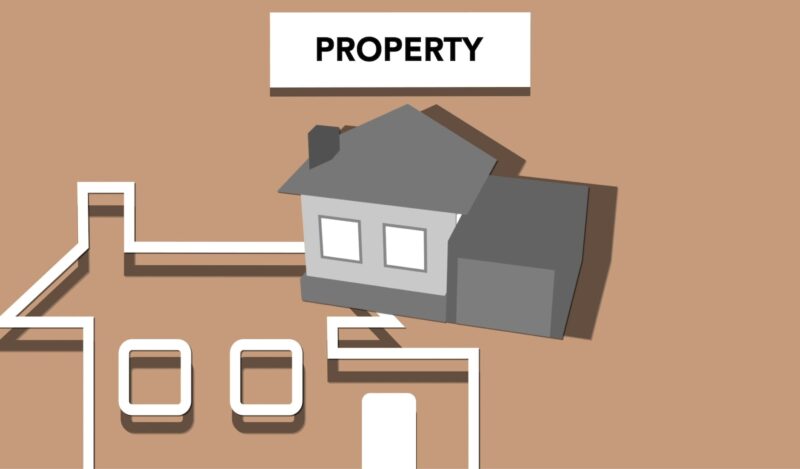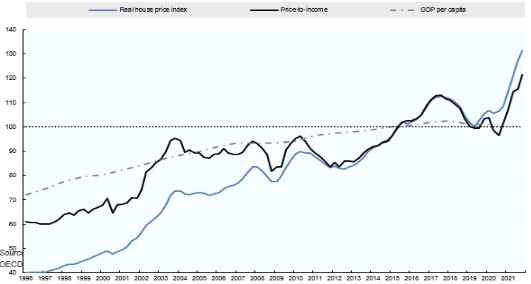
During a cost of living crisis, which many in the world are now experiencing, it is easier to get in touch with the essentials necessary for living. Food, shelter, and energy are the essential ingredients for survival in our modern worlds. The financialization of essentials by capitalism is proving to be at cross purposes for those trying to survive in a cost of living crisis. What do I mean by this? The march toward a consumer society has meant that all these basic requirements of life are things you have to buy. Few of us go out and dig up or hunt for our food these days. Putting a roof over our head is an expensive purchase in the 21C. Plus, all of our devices and vehicles run on forms of energy which we have to buy. Neoliberalism promised to make things easier and cheaper for all in this regard but has manifestly failed to do so. We were told that if governments got out of the way and let private enterprise do what it’s best at we would all be much better off. Thirty years of this, ‘the market knows best’ ethos, has placed at least a third of working Australians in dire straits when it comes to affording the basics of life. Neoliberal economic policies have failed us in every essential market.

Food Prices In An Uncompetitive Grocery Sector Downunder
Let us begin with food. Australia has a celebrated duopoly in our grocery sector. Coles and Woolworths control some 65% of this market, which means most Aussies are buying their food from these two supermarket companies at their many stores around the nation. Prices have gone up, up, and up over the last 2 years in every category. High inflation globally has been the major cause of this, apparently. Shopping trolleys half full of food and groceries now cost hundreds of dollars at the checkout. Australia has no price controls, rather it leaves it to what the free market consumers are prepared to pay. However, in economics it is understood that if suppliers have a monopoly or duopoly, which means there is little or no competition in supplying that market, they can then set the price and the consumer just has to pay it. The power in that transactional relationship has shifted to the seller away from the buyer. Competition is an integral part of a functioning free market system. If most economists and people with a basic understanding of how free market economies work know this, why have we ended up with a non-competitive food and grocery sector in Australia?
The Free Market Economy Rigged In Favour Of Big Businesses
Power imbalances and louder voices closer to governments and decision makers within the system, is the simple answer. The supermarket sector is not the only non-competitive market we have in Australia. Oh no, it is, in fact, a common theme running through all of our markets and sectors. This is despite the fact that we have had something called the ACCC, the Australian Competition & Consumer Commission, specifically created to enforce and maintain competition in our business sectors. Complete and utter failure could be words employed to describe their efforts over the last 30 years. In all fairness to those appointed to run this agency it has been undermined and underfunded by successive governments in thrall to powerful business interests. It is but another toothless tiger amid many in the regulatory sphere in Australia. We like to establish such bodies and give them high falutin titles but ensure that they have no real power. This is the underhand card trick performed by those in government who want to be seen to be doing something without upsetting the established status quo. In reality, the big end of town, Corporate Australia, goes about its merry way merging and acquiring its competition to make ever more money for its investors. Coles in its latest half yearly profit is delivering 30% ROI and generating billions along the way.
“The ACTU calls on Coles to reduce its prices following today’s announcement of its half-yearly profit of $594 million. The profits generated on items increased, with underlying gross margins up by 7bps to 26.6% and its EBIT margins up since pre-pandemic.”

Canada Has The Same Concentration Of Market Share In Grocery Sector
Canada has exactly the same problem with an oligopoly of 3 giant supermarket chains controlling their grocery sector. This should not be a surprise because corporations regularly look beyond national borders for CEOs and growth strategies. The real issue is that the unregulated market does not look after everybody, especially when it comes to dealing with the essentials of life. Food is not just another product to be treated as an economic unit. If companies, like supermarket chains, become so dominant within their sector they have moral responsibilities beyond delivering ROIs for their shareholders. If they do not realise this themselves, then, governments have to step in. In Australia, we have some 6 official enquiries into this sector, due to what is happening in terms of ordinary citizens not being able to afford to buy food and groceries. However, what will these reviews be able to do? Will they just be more talk fests or can they actually effect positive change? We will have to wait and see.
Is Housing Primarily About Shelter Or Wealth Creation In Australia?
Shelter or housing is another essential of life and it is big business in Australia and Canada. Again, both countries are in the midst of housing rental crises. Again, the market did not take care of business in terms of providing enough low cost housing for the denizens of each nation. Governments stopped building social housing a couple of decades back and let the market do its stuff. Of course, the market was primarily interested in high returns from high cost housing and apartments. In fact, they were rapidly converting existing low cost housing into high cost housing. The market wasn’t interested in the group of people who required budget accommodation to fit their socioeconomic needs. Now, we have a real crisis on our hands with poor people and families living in tents on the fringes of cities here in Australia. Downunder we have a well patronised governmental blame game, where state governments and the federal government each blame the other for not fulfilling their responsibilities to the people. This has been going for decades and probably centuries. It is easy to be cynical about such things but the bitter truth is that another essential of life, another basic, is not being delivered by those in charge of the ship. Why is this happening?

Finance & Business Concerns Driving The Bus
Governments listening to those solely motivated by making large amounts of money. Business people, often, go around thinking and acting as if their pursuits are the only really important thing in the world. We live in a capitalist free market economy and business turns the wheels that make everything work, according to many with an MBA. In actual fact, there are other considerations which need to be factored in to make a modern society function optimally. Economics has ruled the roost over the last 50 years to the detriment of other considerations. The neoliberal economic approach has had the ear of governments across the globe for much of that time. Prior to the 1970s and 1980s governments used to think that they had a moral duty to look after the poor and those unable to look after themselves. A shift happened, which came from the Rand organization during the JFK administration in the United States. Economic studies became the preferred way of looking at everything governments had to do. Everything had a dollar value and this slowly began to change the way we thought about helping others and seeing the world. This economic filter promised to provide dispassionate scientific truth rather than assumptions built on sentiment. In actual fact, economics is not a real science, no matter how hard economists wish it be otherwise, and it is predicated on plenty of assumptions of its own. The upshot of this is that economics became the lingua franca and didn’t the commercial world love that – now you’re talking my language! The financialization of essentials has occurred at pace over the last few decades.

Property Price Inflation- Yeah We Love That!
What is housing primarily for? Ask yourself this. In Australia, the property market has been out of control since former PM John Howard delivered the capital gains tax discount on the family home. Inflation in this sector has been running hot ever since at around 325% over the last 30 years. However, we don’t call it that when it comes to the property market. No, everybody wants the value of their property to go up, up and further up. Buying a house now costs near on average of a million dollars. My parents bought a house in an average suburb in Perth for $30k in the late 1970s and this same house with little done to it but a few licks of paint sold for just under that million mark 4 years ago. Many young home buyers can no longer afford the deposit to get a home loan from our heavily concentrated banking sector. The big 4 banks, they call them, have swallowed up all their competition. Indeed, ANZ knocked back by the ACCC initially, was just granted permission by a court to swallow Suncorp, one of the very few remaining smaller banks. It is hard to justify this decision in the highly concentrated Australian banking sector if anyone in charge was really serious about valuing competition. Is housing primarily about providing shelter or is that an outmoded idea in this day and age? Housing is the biggest financial element within the domestic Australian economy –
“The total value of residential dwellings in Australia rose by $261.0 billion to $10,267.4 billion this quarter.”

Providing shelter from the storm for poor people and those in need seems a puny consideration amid such a large number of dollars in value for homes in Australia. It is like the game of life is a board game, but with real money, Monopoly, perhaps? A third of the nation already own at least one residential property and many within that cohort own multiple houses. Our members of parliament, in the majority, are home owners and many of them are landlords too. It seems to me that if you did not realise that you were supposed to be playing this board game you are now at a distinct disadvantage economically. Some pundits talk of a 2 speed economy in Australia, where the crucial divide is predicated on property ownership.
This divide between rich and poor has accelerated immensely since the Howard capital gains tax discount effect came in to play. Alan Kohler, the ABC financial journalist penned an excellent essay on this topic just recently.
“High-priced houses do not create wealth; they redistribute it. And the level of housing wealth is both meaningless and destructive. It’s meaningless because we can’t use the wealth to buy anything else – a yacht or a fast car. We can only buy other expensive houses: sell your house and you have to buy another one, cheaper if you’re downsizing, more expensive if you’re still growing a family. At the end of your life, your children get to use your housing wealth for their own housing, except we’re all living so much longer these days it’s usually too late to be useful. And much of this housing wealth is concentrated in Sydney, where the median house value is $1.1 million, double that of Perth and regional Australia.”

Banking Oligopoly In Australia So Profitable
Our banks in Australia are among the most profitable in the world. The big 4 regularly make profits in the tens of billions of dollars. Large parts of this are down to lending money on home loans for investors. The financialization of shelter is an exceedingly profitable business in Australia.
“AUSTRALIA – A record breaking year for Australia’s major banks saw cash earnings soar to an unprecedented $32.5bn, eclipsing the record last set in 2017 ($31.2bn). This was due to the combination of healthy balance sheet growth and Net Interest Margin (NIM) uplift, with net interest income rising by a never-before-seen $9bn. As notable expenses continue to fall, the result could have been higher, if it weren’t for normalising levels of credit expense and inflationary impacts on costs. “
Our central bank, the Reserve Bank of Australia (RBA), has been steeply raising interest rates on the cash rate over the last 2 years in a bid to dampen demand within the economy and rein in inflation. This monetary policy lever is the preferred means of managing inflation within national economies globally. Of course, it also delivers much increased revenue to banks and the government during the period of higher interest rates. It seems in our system those closest to the controls never lose out no matter the fluctuations within the economy. It is a rigged game for those of us standing on the fringes or unaware we were playing the game in the first place.
“Some businesses are using the “cover” of high inflation and a lack of competition to push up prices, Reserve Bank of Australia governor Michele Bullock has said.
The so-called price-gouging asserted by the Greens and former head of the competition regulator Allan Fels meant it was important to reduce inflation to the RBA’s 2 to 3 per cent band, to make it harder for firms to push up prices, Ms Bullock said.”
The Governor of the RBA has finally come out and admitted price gouging has been going on under the cover of high inflation by Australian businesses amid the lack of competition within our markets.

Neoliberal Privatization Promised Cheaper Prices
Back in the 1990’s we were promised that the privatization of public utilities would deliver cheaper power prices via the neoliberal economic policies embraced by the LNP and Labor governments. Of course, this has not happened, although some Australian business people have become very wealthy through the privatization of public assets. We have wholesale energy markets setting prices for the generation of electricity in states around the nation. The energy sector is facing the demands of global warming and the need to transform, away from a dependency on fossil fuels like coal. Power stations are ageing and having to be phased out. Solar rooftop has been the runaway success story; after a late start thanks to politicians captured by the money and influence of the coal lobby. We still hear more about the doom and gloom of an uncertain future with renewables because the corporate media oligopoly is also controlled by vested fossil fuel interests via their advertising spend.
The mineral lobby is a powerful entity in Australia, as we can see by the fact that they are so lightly taxed by our governments in comparison to other resource rich nations like Qatar and Norway.
“And if you don’t believe those decisions make a difference, just consider the fact that in Norway, they tax the fossil fuel industry and give kids free university education, in Australia we subsidise the fossil fuel industry and charge kids a fortune to go to university.
Indeed, the Commonwealth collects more revenue from HECS fees than it gets from the Petroleum Resource Rent Tax. Choices matter.”
Values matter and the decisions made by our leaders tell the story. Australia values those that dig up the rocks more than the minds of our children, who are our future. Rocks run out and we should derive as much revenue and taxes as possible whilst we have them. At the same time, we should provide the best education possible for our kids and make it as accessible as possible to all of them wherever they live around the nation. We need political leaders who are progressive rather than stuck in the past. The world is forever changing and we are challenged to keep up and meet the demands of that ever changing world.

Do Corporations Bear Any Responsibility For Public Good?
Younger Australians are now faced with a present where they cannot in all likelihood afford to own their own home. Wage growth, although getting a bit better with a 4% rise, has not kept pace with inflation and the cost of living. Rents have risen by 20% and up to 50% in some quarters over the last couple of years. Food prices have been consistently higher over the same period in every category. Grocery prices are likewise up across the board. Services like insurance have ramped up their premiums too and declared record profits this year. Petrol prices have been high for the past few years. Electricity charges have been going up by double digits. High inflation works like pass the parcel with every business taking its turn to put up its rates to keep pace with its costs and then some. The financialization of essentials has meant many poorer Australians are struggling to make ends meet. Corporate Australia, Qantas being a prime example, sees no public responsibility in its remit and has raised prices to record highs and made record profits whilst the nation they do business in has been experiencing a dire cost of living crisis. Is there something wrong with this picture? Does business have any moral duties to serve the community in which they operate and live? The bottom line is well named because these companies could not go much lower in the public esteem they are currently held. Woolworths, Coles, Qantas, PwC, Optus, Medibank Private, CBA, and the RBA are all on the nose for various reasons. The corporates talk a good game but their pricing policies have told the real story about how they hold the Australian people in such low regard.

Private Wealth vs Public Good In Australia
The battle politically is always about the public good vs private wealth. The LNP Coalition promote aspirational desires for greater private wealth among their voters. Taxation is an evil in their book and governments should stay out of the market. They want to turn Australia into a pallid copy of the United States, heaven help us. Corruption in business always accompanies their neoliberal economic policies. Low regulatory sectors attract scumbag business folk like flies to s***. The outcome is the few getting rich and the many getting second best. Health in the US is a ‘for profit’ business and there is no universal health insurance like Medicare. More people go bankrupt in America trying to meet their medical bills than for any other reason. Pharmaceuticals in the US are priced thousands of dollars more expensively than in Canada or here in Australia. Why? So that big business can make fat profits at the expense of human suffering. Bernie Sanders just confronted the CEOs of the major Big Pharma companies about this in a senate enquiry. The upshot is that business does not know best and markets do not function better without regulation.
The proof is the lack of competition everywhere you look. These companies manipulate the market via mergers and takeovers. They do their best to remove competition so that they can make more money. You cannot have the henhouse being guarded by the fox. Neoliberalism just doesn’t work.

In Australia, we are faced with markets overwhelmed by corporate domination by one, two or maybe three companies. Woolworths and Coles control the lucrative liquor market as well to more than 70%. These huge entities have bought up every bit of competition in their path. Our complacent governments have looked on with their usual apathy. Government in this country is a glad handling cheer squad for big business. Could large donations to their political parties have anything to do with that, I wonder??? Corruption or plain old incompetence or a bit of both? The government non-interference line has been a well-trodden path over the last 30 years. It has delivered non-competitive markets where consumers are sitting ducks for price setting businesses.
We the people have been denuded of economic power within the so called free market economy that our nation subscribes to. So, what are we going to do about it!
Robert Sudha Hamilton is the author of Money Matters: Navigating Credit, Debt, and Financial Freedom.
©MidasWord













